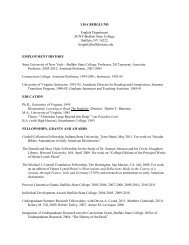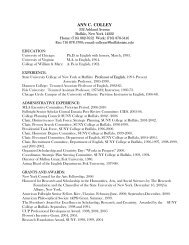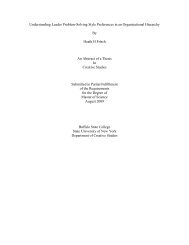POLITICS VERSUS SCIENCE: APPORTIONING ... - Buffalo State
POLITICS VERSUS SCIENCE: APPORTIONING ... - Buffalo State
POLITICS VERSUS SCIENCE: APPORTIONING ... - Buffalo State
Create successful ePaper yourself
Turn your PDF publications into a flip-book with our unique Google optimized e-Paper software.
Article 174 (environment) of the EC Treaty introduced the precautionary principle<br />
into European Community law. The Commission extended it to food safety, first to<br />
defend its ban on the importation of meat containing hormones and later in banning<br />
GMOs. 4 Furthermore, the Commission lays out, in its communication on the<br />
precautionary principle (Commission 2000d, 10), its justification for extending it to other<br />
policy areas, writing that “Like other general notions contained in the legislation, such as<br />
subsidiarity or proportionality, it is for the decision-makers and ultimately the courts to<br />
flesh out the principle.” According to the Commission, the ECJ and Court of First<br />
Instance had adjudicated cases at least partly drawing on the precautionary principle,<br />
while both the European Parliament and Council had approved the use of the<br />
precautionary principle in human health. Hence, the Commission (2000d, 10) concludes:<br />
Although the precautionary principle is not explicitly mentioned in the Treaty<br />
except in the environmental field, its scope is far wider and covers those specific<br />
circumstances where scientific evidence is insufficient, inconclusive or uncertain<br />
and there are indications through preliminary objective scientific evaluation that<br />
there are reasonable grounds for concern that the potentially dangerous effects on<br />
the environment, human, animal or plant health may be inconsistent with the<br />
chosen level of protection.<br />
Proponents of the precautionary principle have been frustrated in their efforts to<br />
elevate it to the status of international law. When the WTO ruled against the EU’s ban on<br />
beef from hormone-fed cattle, one group (Public Citizen) refered to it as “the evisceration<br />
of the precautionary principle” and a demonstration that “the SPS Agreement exalts the<br />
role of science far beyond the point it is appropriate, attempting to eliminate all ‘non-<br />
science’ factors from standard setting” James Cameron (1999, 261).<br />
4 The precautionary principle has informed EU policy on hormones and GMOs, despite formal complaints<br />
filed by the U.S. and Canada in the WTO. (Commission 2000e, Vogel 2001).<br />
7












